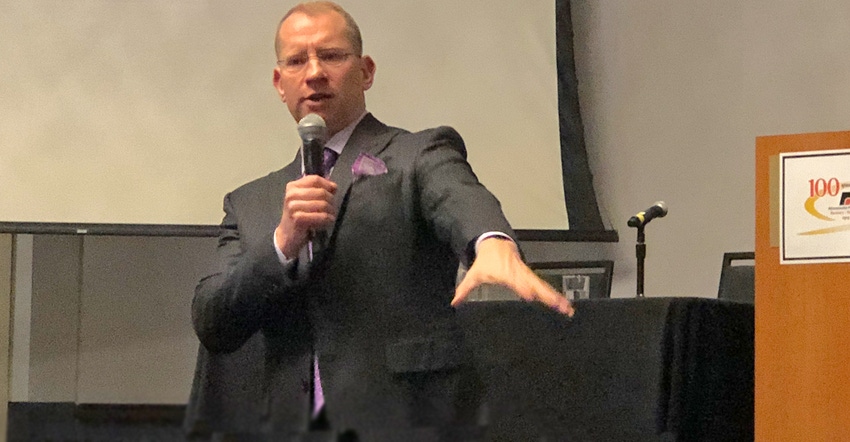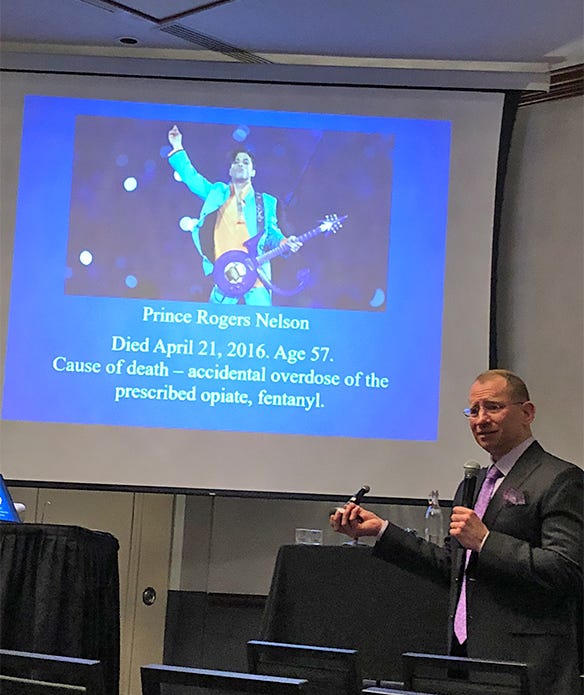
More than once, Dr. Chris Johnson apologized to his audience.
Johnson, an emergency room physician and chairman of the Minnesota Department of Human Services’ Opioid Prescribing Work Group, was giving a presentation Nov. 17 on the opioid epidemic at the annual Minnesota Farm Bureau Federation meeting.
“I apologize,” he told attendees. “My profession did this to you. … the medical industry failed you.”
Johnson offered a wide-ranging report on how the United States ended up consuming 80% of the world’s opioids. In the last 20 years, the number of opioid prescriptions tripled, from 70 million to more than 220 million per year, he said.

DIED TOO YOUNG: Twin Cities physician Chris Johnson noted several well-known people have died due to painkiller overdoses, including Minnesota-based Prince.

Sadly, drug overdose deaths continue to climb. The Centers for Disease Control and Prevention recently reported 70,000 overdose deaths in 2017. That compares to less than 20,000 in 2014.
Rural communities are not immune. In October 2017, the CDC reported that opioid overdose rates in rural areas had surpassed the rates recorded in urban areas. In 2016, there were 395 opioid or heroin-related deaths in the state of Minnesota, according to MFBF, an 18% increase from the year prior.
Also in 2016, there were more than 3.5 million opioid prescriptions written in Minnesota.
MFBF, along with Minnesota Farmers Union, has been active in educating its members about opioids for the past year. In late 2017, the American Farm Bureau Federation and the National Farmers Union collaborated on a project called FarmtownStrong to raise awareness. The collaboration uses its agriculture network to help address the opioid crisis with local resources. All members are encouraged to get involved in helping shape their community’s response to this crisis.
Opioids everywhere
Opioids are a category of drugs that includes heroin and other pain relievers that are generally available by prescription, such as oxycodone, hydrocodone, morphine and codeine. All these drugs share a closely related chemical makeup that makes them highly addictive and potentially dangerous. If taken for short periods of time, opioids can be effective in treating pain. However, when misused or used long term, they can lead to addiction, incidences of overdose and death.
As a doctor at two metro area hospitals, Johnson said he saw people of all types and affluencies become addicted to opioids.
“My take-home for you is that [to the brain], all opiates are heroin, and that addiction has nothing to do with morality,” he said.
Johnson explained how over the past two decades, pharmaceutical companies used a multiprong approach to market their painkillers to the medical profession and then get buy-in from federal regulators.
Pharmaceutical companies targeted pain specialists and primary care doctors, telling them that pain was an untreated epidemic and could be safely treated, he noted. They relied on other doctors to help champion the cause, citing untested theories that painkillers were not addictive. They also gave gifts, starter pain pill program coupons and free pills to doctors. More than 40 all-expense-paid trips to conferences were sponsored between 1996 and 2001 by the companies.
In the early 1990s, pharmaceutical companies began to infiltrate the federal government, pushing for the passage of the 1992 Prescription Drug User Fee Act. The act allows FDA to collect fees from drug manufacturers to fund the new drug approval process.
“The FDA is the pharmaceutical companies’ No. 1 client,” Johnson said. “Fifty percent of the FDA’s budget now comes from industry.”
The lines between advocating for patients to be pain-free and marketing painkillers continued to blur as patient advocacy groups formed, supported by drug companies, he said. For example, the groups Partners Again Pain, the American Academy of Pain Management and the now defunct American Pain Foundation have, or had, pharmaceutical industry funding.
In Johnson’s estimation, there is no drug epidemic in the United States — the only country dealing with opioid addition at such high levels.
“There is not an epidemic of chronic pain,” he said. “That’s called life.”
Despite reports on the opioid crisis, hospitals and doctors continue to wrestle with writing pain pill prescriptions. Why? The pressure to do well on patient surveys.
“Hospitals want high survey scores,” he said. “The emphasis is on customer satisfaction. The priority is to make money for the owners and investors, even for not-for-profits.”
Reform needed
Several changes must take place, Johnson said, to reduce the number of people addicted to painkillers and dying from overdoses. First, the public must understand that to the human brain, all opioids act like heroin — they bind the same receptors. Second, people who have reoccurring pain should not get opioids. Rather, other treatment options should be pursued.
Third, a major overhaul is needed in health care, starting with publicly funding the FDA and removing the industry apron strings.
And last, Johnson said, society must step up and stop the moralizing language surrounding addiction.
“This is not a disease of morality,” he said. “The life for the addicted is a life of misery for the family and for the patient. We are trying to restore hope.”
If you or a loved one is dealing with chronic pain and opioid addiction, reach out to the Steve Rummler Hope Network, Minnetonka, Minn., at 952-943-3937 or [email protected].
Learn more about the farm organizations’ opioid initiative by visiting farmtownstrong.org.
About the Author(s)
You May Also Like






